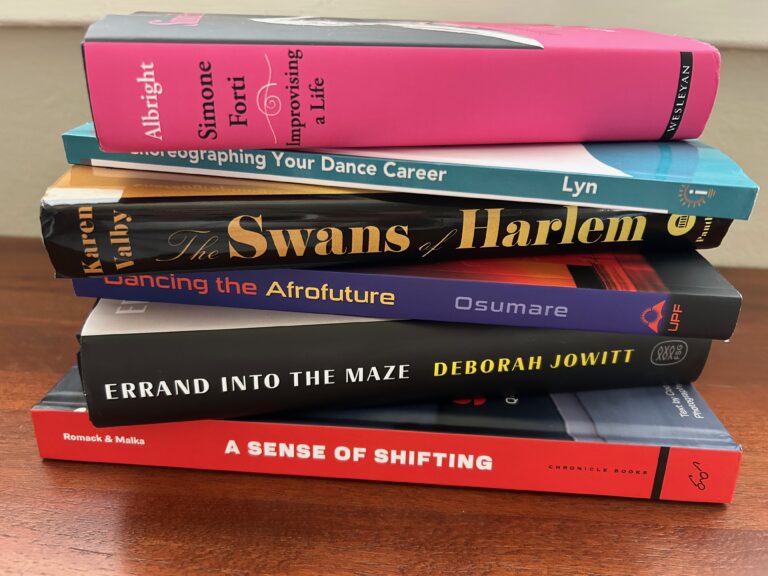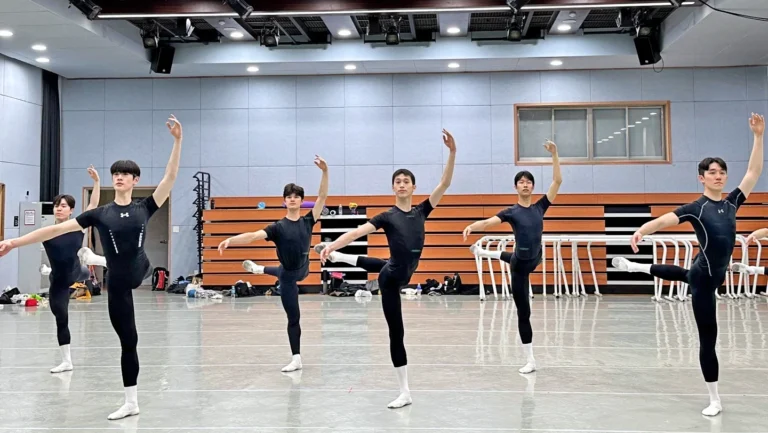Angela Amoroso and Drew Skinner are partners in Scripps Performing Arts Academy in San Diego.
When Nena Gilreath and Waverly Lucas moved their Ballethnic Dance Company and its affiliated dance academy into the organization’s first real home in Atlanta, the married couple shared an office. But the movers were given specific instructions.
“I told them, ‘Waverly’s desk goes on that end of the room and my desk goes on this end.’ We both had our own space,” Gilreath says. “Both of us have very strong, stubborn personalities and like things a certain way. We learned early on that we had different strengths and that we needed ways to separate ourselves a little, even though we were together all day. Now, in our current space, his office is downstairs and my office is upstairs and that works very well for us.”
For some couples, the thought of working day-in, day-out with a spouse would be something akin to dragging fingernails across a chalkboard. Pure torture. But in the dance world, many studios are a family affair with husbands and wives saying “I do” not just to each other, but to sharing responsibility for everything from teaching to balancing the books.
Those who take the plunge down the studio aisle say the key to success comes down to recognizing and respecting each partner’s strengths and weaknesses and divvying up duties accordingly.
Take the Ballethnic team. The duo began dating back in 1987 when both were dancers with Dance Theatre of Harlem, and they started their company in 1990 and school in 1991. They got married in 1992. All that time together, they said, means they’ve learned how to make their different strengths and styles an asset for their business.
“She’s much better at the organizing, paperwork type of things. I do more of the creative, choreography, rehearsing part of things,” Lucas says. “We balance each other out. We don’t always agree, but that’s a good thing, because I can honestly say if she agreed with me constantly, I would make so many mistakes.”
Gilreath and Lucas and their separate offices may be a bit unusual, but their method of separating duties according to strengths is something many dance studio couples say they do as a matter of course.
Kathy and Joe DeMaira are typical of a lot of studio-owner couples. Kathy is the one with the dance background, while Joe, who has a degree in business, left his job as a union painter apprentice last school year to help run the two-year-old studio. Now, Joe handles most of the business end of running the DeMaira Dance Studios, which has locations in Oak Park and Chicago. They often find themselves working at different locations each day, more by chance than design, they say. Married almost nine years, they say the key to success has been communication.
“One of the things we talked about before we even got married was communication. We just said, ‘Hey, neither of us has ESP. I can’t read your mind and you can’t read mine,’” Kathy says. For Joe, that has meant learning the hows and whys of the system Kathy had already set up for the studio.
“When I first started out, I had a hard time understanding how she came up with some things,” Joe says. “She would say, ‘I want you to feel that this is your business, too,’ but she had her own system and I had to learn it. But I’m very happy with what I’m doing now. This is what I always wanted, to run a business, to be in charge of a business.”
Nena Gilreath and Waverly Lucas performed with Dance Theatre of Harlem before starting Ballethnic in Atlanta, GA.
And working with a spouse on a project you both believe in is a powerful lure, says Melissa Morris. She left her own career as an administrator and visual merchandising designer in 2005 to help husband Chip run the Acton (MA) School of Ballet and its affiliated company, The Commonwealth Ballet. Chip, who had taught at the studio for 14 years, purchased the school in 2004, the same year the couple got married. Now Melissa serves as the school’s administrator, liaises with teachers, helps write the storylines to their original ballets, orders costumes and designs the company’s sets, while Chip handles the artistic side of things.
“We just take pleasure in things that I’m not sure I would have stopped to think about when I was younger,” says Melissa, who like Chip is in her 50s. “You feel like you’ve crafted something together that is very meaningful. And the truth of the matter is, for me, this is a total love match. I’m just happy to be with him all the time.”
Adds Chip, “Sometimes people don’t want to see their spouse at work. I’m just happy to see her all the time.”
Of course it’s not all hearts and flowers. Every business experiences challenges. In the case of studio owners, those challenges can range from declines in enrollment, scheduling snafus or issues with the staff to finding ways to take time off from the seemingly endless stream of e-mails and telephone calls. Added to that are the typical ups and downs of married life that every couple experiences.
Studio owner couples say remembering to maintain a sense of professionalism was the key to keeping the inevitable business and personal stresses and resulting squabbles away from the ever present eyes and ears of the studio staff, parents and students.
“It’s not a complete mystery when there’s tension. Of course I think it’s inappropriate to bring it into the office. But to say it isn’t here sometimes would be ridiculous. I’d be lying,” says Darlene Casanova, a former dancer who runs the dance and music studio, Imagination Place, in Salt Lake City, Utah, with her husband Paul Mulder. “It’s definitely a challenge sometimes because there’s no separation.”
Melissa Morris left her career to join her husband Chip at Acton School of Ballet.
Mulder adds there have been times when he’s thought that maybe he should get another job instead of helping to run the school they’ve had for 12 years. The two, who have been married for 18 years, have two children, another challenge requiring constant juggling that many studio owners also share.
“The day-to-day of operating a studio is tough to manage sometimes. But I can honestly say that after 11 years, you realize there are more benefits than not. Sometimes it’s easy to forget that,” says Mulder, an actor who divides his schedule between acting jobs and handling the studio’s administrative and customer service duties. “And one other benefit is that we both understand how much work the other is doing and how hard they’re working, so there’s an appreciation on that level.”
Dealing with day-to-day headaches is one thing. Dealing with a major tragedy while running a studio together is something else altogether. For Angela Amoroso and Drew Skinner, that nightmare scenario became a reality in 2004 when the couple’s daughter was born three months premature, suffered a series of complications and died after three months from Sudden Infant Death Syndrome.
The couple said their studio family at the Scripps Performing Arts Academy in San Diego not only supported the couple as they grieved, but were instrumental in helping the couple to establish Isabella’s Giraffe, a nonprofit organization that provides emotional and educational support for parents with infants in a Neonatal Intensive Care Unit (NICU). So far, Isabella’s Giraffe has raised $470,000 for the NICU at the University of California–San Diego Infant Special Care Center.
“In getting through our grief, what really supported us was the tremendous love of all those parents. I was able to go to the studio and tell my story. I had all these mommies who embraced us and allowed us to tell our story over and over again,” says Amoroso, who opened Scripps in 1987 after eight years of running her own studio in the New York City area.
The couple, who have been married for seven years and have grown children from previous marriages, add that the school’s staff also jumped in to help the couple cope with the death of their baby daughter.
“There were times when Angela would go to teach a Mommy and Me class, and it would be too much for her to see this studio of little girls. She would just have to turn around and leave,” Skinner says. “But we had a great staff and they would fill in at a moment’s notice.”
Adds Amoroso, “In situations like ours, they talk about how you have to get your emotions out so you can resume your new normal. It’s that show-must-go-on mentality. You have all these children relying on you to go on. The circle of life continues. And that beautiful cycle created a healing in our hearts.”
They call him Mr. Herb.
Herb Flynn doesn’t teach dance. In fact, he doesn’t dance at all. He’s an electrical engineer for a solar company. But at Dance Dimensions in Brookfield, Connecticut, Mr. Herb is an essential part of the studio.
What exactly does he do? Plenty. And it goes far beyond just being married to the boss, studio director Dody Flynn. “I do a little bit of everything—from changing the light bulbs to actually building the studios, which I’m doing right now,” Herb Flynn says. “At recitals I do the tickets, work backstage, do lights. I follow the competitions. I get lunch and dinner. I pick up our kids every night.”
He even helps select and cut music for competitions and recitals, says Dody Flynn. “He supports me. I talk things over with him all the time. If there’s a dispute with a parent or something like that, he’s always on the same page with me. And he gives me the guidance to see the other side of things sometimes.”
Herb Flynn, who started dating his wife while they were teens and she was performing and competing, says he’s learned over the years that his wife doesn’t need his protection. “She’s pretty tough,” he says. But she does need his support. The couple, who have two children, got married 14 years ago just before purchasing the studio.
Such active and wholehearted support from a spouse isn’t always a given, studio owners report. Sometimes a spouse’s distance from the studio’s daily churn is arrived at by mutual agreement. And stories abound of marriages that have broken up because of a spouse’s complaints that their studio-owner mate was spending too much time immersed in studio issues.
“There are some marriages that have problems. I’m lucky. The only thing my husband gets perturbed about is Nationals during the summer. He thinks they’re too long. We don’t actually get to take a family vacation that’s relaxing,” says Cathy Nesbitt-Stein, director of Candy Apple’s Dance Center in Canton, Ohio. “But my husband has never said I should spend less time with the studio or complained that it was just a hobby.”
“She is running a business and she has her schedule,” says Mike Stein, who works full-time as an insurance adjuster and cares for the couple’s 5-year-old in the evenings while mom is at the studio. At Candy Apple’s, his unofficial jobs include handling assorted odds and ends like making sure the soda machine is filled. He’s also part of a group of dads that performs at recital. “You have to realize it’s a business and things are always going on.”
Of course there are some frustrations. E-mails and phone calls are a constant headache. Stein says when his home phone rings he knows it’s probably something about the studio. He tells people who need to reach him to call his cell phone instead.
Herb Flynn adds that he sometimes puts his foot down when he feels his wife has volunteered too much of her previously free time. “She can take on more than she’s able to do sometimes. She tries to stretch herself too thin,” Flynn says.
But both couples say they make an effort to set aside time to be together, whether to go out to dinner or to go on a long drive. “We go out to eat just the two of us, but we’ll talk about the studio half the time. I don’t try to fight it. It’s part of what we do. I consider myself a silent partner,” Flynn says. “My recommendation (to other spouses) would be to not fight it. Become a part of the business. The way we look at it, it’s our business, not just her business. It’s just that I can’t teach dance.”
Karyn Collins is a New Jersey–based writer and dance teacher.
Photos from top: courtesy of Scripps Performing Arts Academy; by Keiko Guest, courtesy Ballethnic; courtesy Acton School of Ballet




